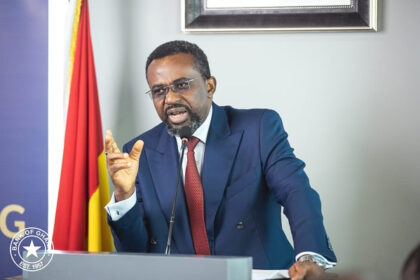By: Abdul Shakur Omae
Tensions between Ghana’s legislative arm and security agencies appear to be deepening following a strong worded memorandum issued by the Office of the Minority Chief Whip to the Speaker of Parliament, Rt. Hon. Alban Kingsford Sumana Bagbin.
The memo, signed by the Minority Chief Whip, Hon. Annoh Dompreh, expressed grave concern over what it described as a “troubling pattern of non-compliance” by national security and intelligence agencies, particularly the National Intelligence Bureau (NIB), in their engagements with Members of Parliament.
The letter references a recent attempt by operatives of the NIB to arrest Hon. Rev. John Ntim Fordjour, the MP for Assin South and Ranking Member of the Defence and Interior Committee. According to the Minority Caucus, the attempted arrest which took place at the MP’s residence came shortly after Rev. Fordjour delivered a press statement in Parliament on behalf of the Minority, addressing a matter of national importance.
The Caucus contends that this action constitutes a blatant disregard for the directives previously issued by the Speaker, which emphasize due protocol when dealing with sitting MPs. In the memo, the Chief Whip recalled the Speaker’s communication to the NIB just a week prior on April 2, 2025, reiterating that investigative engagements with MPs must adhere to constitutional safeguards, particularly Articles 117 and 118 of the 1992 Constitution.
“These articles are not merely symbolic,” the memo stated, “but are grounded in the principles of parliamentary privilege, the rule of law, and the constitutional mandate given to Parliament as an independent arm of government.”
The memo cited prior cases involving the MPs for Yabga/Kubori and Gomoa Central, Hon. Mustapha Ussif and Hon. Kwame Asare Obeng respectively as instances where the Speaker had intervened to ensure decorum and adherence to due process in engagements with lawmakers.
Political observers say the timing of the attempted arrest is particularly sensitive. Hon. Fordjour’s press conference had reportedly touched on controversial national security operations, a topic that has generated public debate and divided opinion.
“This appears to be an attempt to silence MPs from freely speaking on national matters,” one political analyst told reporters. “It could have far-reaching implications for parliamentary independence.”
The Minority Caucus is now calling on the Speaker to take urgent action by reasserting his directives and engaging with the leadership of national security institutions to avoid future infractions.
“Such actions not only undermine the authority of the Office of the Speaker but also violate the privileges and immunities of Members of Parliament,” the memorandum noted. “They pose a serious threat to the separation of powers and the respect accorded to elected representatives in the performance of their constitutional duties.”
As of press time, the Office of the Speaker had not issued an official response, though sources close to Parliament suggest that emergency consultations may be underway to address the growing friction between the legislature and security agencies.
The unfolding situation is likely to raise fresh debate about the balance of power between Ghana’s key democratic institutions and the extent to which parliamentary privilege should shield elected officials from security.


